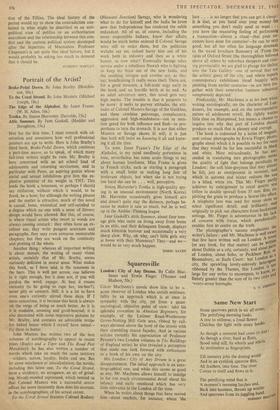Portrait of the Artist?
The Edge of the Alphabet. By Janet Frame. (W. H. Allen, 16s.)
NOT for the first time, I must remark with ad- miration and uneasiness how well professional painters are apt to write. Here is John Bratby's third book, Brake-Pedal Down, which continues a part-time ceuvre, so to speak, of which many full-time writers might be vain. Mr. Bratby is here concerned with an art school load of adolescents and returning servicemen, and in particular with Peter, an aspiring genius whose social and sexual inhibitions give him the ex- plosive potential of his weight in TNT. This lends the book a tenseness, or perhaps I should say titillation, without which it would, to be frank, be a bore; for although the writing pleases and the matter is attractive, much of this novel is casual, loose, whimsical and self-satisfied to a degree which no one with a sense of literary design would have allowed. But this, of course, is where visual artists who resort to words are always coming unstuck : they often have an ex- cellent ear, they write pungent sentences and paragraphs, they may even compose memorable chapters; but they are weak on the continuity and plotting of the whole.
Another thing: whereas all important writing is about morals, the writing of many visual artists, certainly that of Mr. Bratby, seems curiously deficient in moral sense. What makes this book, as I have said, is the tenseness in the hero. This is well put across, one believes in it right enough, but it does not, if you will pardon the word, engage. At best it rouses curiosity (is he going to rape her, tee-hee?), never pity or concern. Still, it is a lot to have even one's curiosity stirred these days. If I seem censorious, it is because this book is always on the verge of being so much better. As it is, it is readable, amusing and good-hearted; it is also decorated with some impressive pictures by Mr. Bratby, and contains an admirable recipe for baked beans which I myself have tested— fry them in butter.
John Masters has written two of the best volumes of autobiography to appear in recent years (Bugles and a Tiger and The Road Past Mandalay); he has also written a number of novels which take on much the same territory —soldiers, action, loyalty, India and sex. But by some mischance or miscalculation, the novels, including this latest one, To the Coral Strand, have a stridency, an arrogance, an air of grind- ing, bloody-minded reprimand, which remind us that Colonel Masters was a successful senior officer far more insistently than does his account, in the autobiographies, of his actual career.
To the Coral Strand features Colonel Rodney
(Bhowani Junction) Savage, who is wondering what to do for himself and the India he loves now that Independence has rendered the sahib redundant. All of us, of course, including the more responsible Indians, know that affairs would be much better ordered if Colonel Savage were still to order them, but the politician wallahs say no, indeed harry him out of his work both in industry and then as a white hunter, so now what? Eventually Savage takes service under a rebellious Nawab who is fighting to keep his State out of the new India, and the resulting intrigue and combat are, as they say, breathtaking (I really mean that). There are, for a good measure, a full-scale orgy early in the book .and an horrific birth at its end. As an adult adventure story, this novel gets very high marks. The trouble is that it purports to be more: it seeks to purvey attitudes, the atti- tudes of Colonel Masters-Savage of the Gurkhas, and these combine patronage, complacency, aggression and high-mindedness—not to men- tion greed for both influence and flesh—in pro- portions to turn the stomach. It is not that either Masters or Savage shows ill will; it is just that both will insist on knowing it all and know- ing it all the time.
To note. Janet Frame's The Edge of the Alphabet, to my mind needlessly portentous in tone, nevertheless has some acute things to say about human loneliness. Miss Frame is given to French tricks, such as starting a paragraph with a small letter or making long lists of irrelevant objects, but when she is not trying too hard she can be . . . well, perceptive.
Simon Harvester's Troika is high-quality spy- ing in an unusual environment (North Korea). Mr. Harvester occasionally gives himself airs and doesn't quite stay the distance, perhaps be- cause he makes it rain so much, but he is well up in the Ambler/Fleming league.
Jane Gaskell's Attic Summer, about four teen- age girls who insist on living away from home in an attic, and their delinquent friends, displays much kittenish humour and occasionally a very sharp claw. Why, oh why, can't little girls stay at home with their Mummies? They—and we— would be so very much happier.
SIMON RAVEN




























 Previous page
Previous page